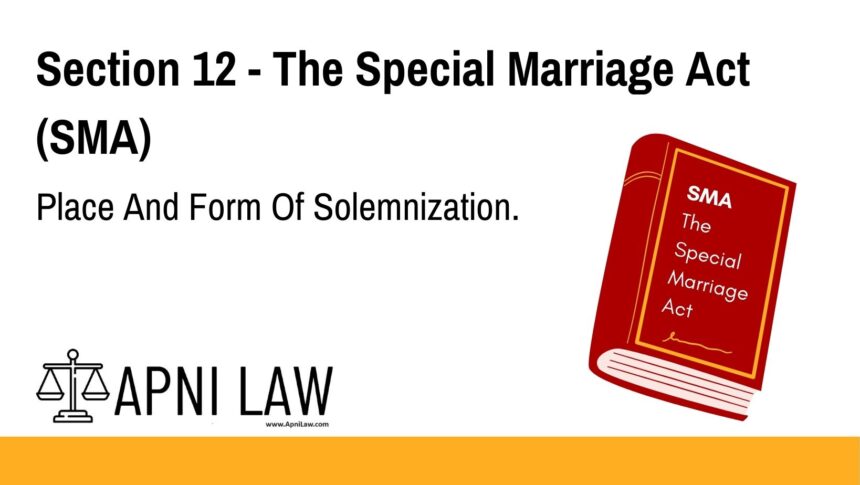Code: Section 12
(1) The marriage may be solemnized at the office of the Marriage Officer, or at such other place within a reasonable distance therefrom as the parties may desire, and upon such conditions and the payment of such additional fees as may be prescribed.
(2) The marriage may be solemnized in any form which the parties may choose to adopt:
Provided that it shall not be complete and binding on the parties unless each party says to the other in the presence of the Marriage Officer and the three witnesses and in any language understood by the parties,–
“I, (A), take thee (B), to be my lawful wife (or husband).”
Explanation of Section 12 of the Special Marriage Act
Section 12 of the Special Marriage Act, 1954 governs the place and the form in which a civil marriage under the Act is to be solemnized. This section provides flexibility and inclusivity in terms of location, cultural customs, and language, while also ensuring legal formality through a mandatory declaration.
Key Provisions:
- The marriage may take place at the Marriage Officer’s office or another location nearby, based on the couple’s preference.
- If solemnized outside the Marriage Officer’s office, additional conditions and fees may apply.
- The ceremony may follow any form or ritual, religious or secular, chosen by the couple.
- However, to legally complete the marriage, both parties must verbally exchange the statutory declaration:
- “I, (A), take thee (B), to be my lawful wife (or husband).”
- This declaration must be made:
- In the presence of the Marriage Officer and three witnesses
- In a language both parties understand
This section emphasizes both freedom of expression and a binding legal acknowledgment of the marital relationship.
Illustration
Example 1: Marriage at the Marriage Officer’s Office
Raj and Meera decide to get married under the Special Marriage Act. They choose to solemnize their marriage at the Marriage Officer’s office. In the presence of the Officer and three witnesses, both say, “I, Raj, take thee Meera, to be my lawful wife,” and vice versa. The marriage is legally solemnized after this declaration.
Example 2: Custom Ceremony with Legal Declaration
Arjun and Fatima want a small garden ceremony near the Marriage Office. They apply for permission, pay the additional fee, and invite the Marriage Officer to the location. They incorporate a few cultural rituals, but ensure that the statutory declaration is made in English (a language both understand) in front of the Officer and three witnesses. Their marriage is thus valid and binding.
Common Questions and Answers on Section 12 SMA
1. Can a couple marry outside the Marriage Officer’s office?
Yes. Section 12 allows solemnization at another place within reasonable distance, subject to conditions and additional fees.
2. Is it mandatory to follow a religious ceremony?
No. The couple can choose any form of solemnization—including a completely secular one—so long as the legal declaration is made as required.
3. What if the couple doesn’t make the statutory verbal declaration?
The marriage will not be considered legally complete or binding unless both parties make the prescribed declaration in the presence of the Officer and witnesses.
4. Can the declaration be made in any language?
Yes, as long as it is a language both parties understand.
5. Who needs to be present during the solemnization?
The Marriage Officer and three witnesses must be physically present when the declaration is made.
Conclusion
Section 12 of the Special Marriage Act ensures that couples have the freedom to choose how and where they wish to solemnize their marriage, while still adhering to a clear legal framework. The mandatory verbal declaration before the Marriage Officer and three witnesses is the cornerstone of this process, establishing the marriage as legally valid. This provision beautifully balances personal choice with legal certainty.
For detailed guides on marriage laws and legal compliance, visit ApniLaw today!








